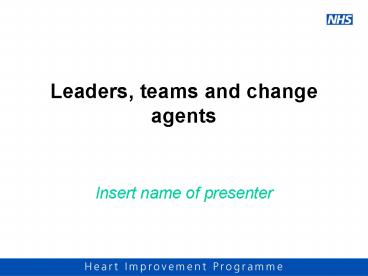Leaders, teams and change agents - PowerPoint PPT Presentation
1 / 25
Title:
Leaders, teams and change agents
Description:
Recognise others role in change management ... Adopter. Main. role. Demonstrate. Connect. Implement. Motivator. What have you done within this role? ... – PowerPoint PPT presentation
Number of Views:57
Avg rating:3.0/5.0
Title: Leaders, teams and change agents
1
Leaders, teams and change agents
- Insert name of presenter
2
Aims of the session
- Recognise your own style of leadership
- Recognise your own role in change management
- Recognise others role in change management
- Understand how to communicate change more
effectively by understanding individuals
3
Leadership
- What does this mean to you?
4
Leadership
- The art of getting things done by enabling
others to do more than they could or would do
otherwise. - Paul Plsek
5
Who are our leaders?
- Who is it that enables us to do more than we
could or would have done otherwise? - Think about leaders in all aspects of life
including society, the NHS and your home life.
6
Are we leaders?
- Do we enable others to achieve more?
- What do we lead?
- Do we think of ourselves as leaders?
7
What type of leader are you?
8
Transactional or transformational?
- Questions 2, 5, 10 13 are about transactional
leader activities. - All other questions refer to transformational
leader activities. - From research by Beverly Alimo-Metcalfe
9
Transactional leadership
- Contingent reward - uses rewards or incentives to
achieve results. - Passive management by exception - use of
correction or punishment. - Active management by exception - actively
monitors work performed. - Laissez-faire - hands-off approach. Does not
respond to problems or monitor performance.
10
Transformational leadership
- Leading developing others
- Showing genuine concern
- Enabling
- Being accessible
- Encouraging change
- Personal Qualities
- Being honest
- Acting with integrity
- Being decisive
- Inspiring others and resolving complex problems
11
Transformational continued.
- Leading the organisation
- Networking achieving
- Focusing effort
- Building shared vision
- Supporting a developmental culture
- Facilitating change sensitively
12
Cycle of Change
13
Roles in change management
Motivator
Adopter
Source
14
Roles in change management
Source
Motivator
Adopter
Mainrole
Demonstrate
Connect
Implement
15
Motivator
- What have you done within this role?
- Was it successful?
- What skills do you need to be an effective
motivator?
16
A quiz!
- I like to work things out by talking them through
(E), OR, I prefer to work them out in my head
first (I). - I prefer to take in information through looking
at the details (S), OR, I tend to use my
intuition (N).
17
What are my working preferences?
- I make decisions by working through a logical
process (T), OR, I prefer to make decisions by
assessing the impact on the individual (F). - I like to organise and structure my work (J), OR,
I prefer to hang out in the uncertainty and do
things at the last minute (P).
18
Myers Briggs Type Indicator (MBTI)
- Internal...External
- INtuitive..Sensing
- Thinking.Feeling
- Perception.Judging
19
MBTI
- External
- Outer world
- Talks through ideas
- Acts then maybe reflects
- Learns best by doing/discussing
- Often easy to know
- Expresses emotion
- Internal
- Inner world
- Thinks through ideas
- Reflects then maybe acts
- Learns by reflection
- Often reserved, hard to know
- Bottles up emotion
20
Implications for enabling change
- External
- Less likely to think before acting
- Use networking skills
- Prefer oral communication
- Share their thoughts/comments freely
- Internal
- Need time to reflect and work out why
- Enjoy working alone or with 1 or 2 others. Divide
work into smaller success loaded challenges - Prefers written communication
21
Implications for enabling change
- Sensing
- Need to convince with details facts
- Want specific examples
- Will want to try it first
- Will want answers to all their questions
- Want to be shown how it works
- Intuition
- Need to convince with vision purpose
- Will want to see how it gives new insights
- Make connection with the bigger picture
- Demonstrate how it fits in with strategy
22
Implications for enabling change
- Thinking
- How it saves time money
- Demonstrates a good cost to benefit ratio
- Be a credible source of information
- Show logic behind it
- Feeling
- Set it within a personal context
- Use personal stories
- Show how it will help people grow develop
- Show how it will benefit individual those they
care about
23
Implications for enabling change
- Judging
- Will prefer no surprises
- Quickly commit to plans or decisions
- Wants things to be settled ordered
- Want to know time order
- Use project plans
- Perceiving
- Enjoys surprises
- Prefer to be tentative
- Reserve the right to change plans or decisions
- Likes to keep their options open.
24
Key points from this session
- In service improvement, we all have a leadership
role - We need transactional and transformational
leaders but we need transformational leaders to
inspire change - Our role is to motivate others bringing people
together to share and spread good practice is key - When we understand how people are different from
each other, we can tailor our communication and
approach to suit their needs
25
We need people with their head in the clouds,
their feet on the ground and their hearts in the
business.
- Anita Roddick































